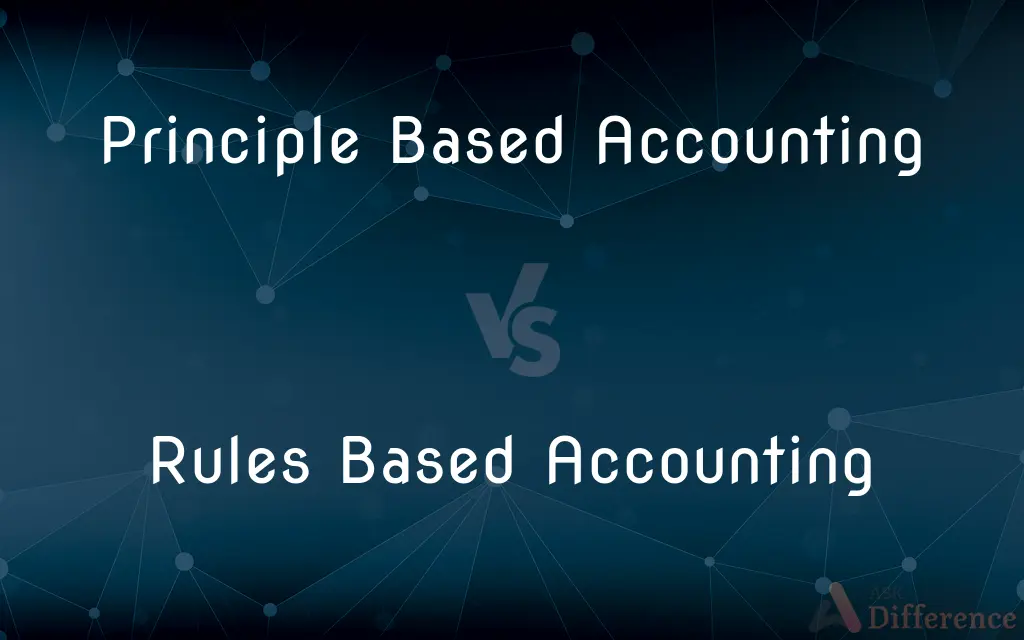Principle Based Accounting vs. Rules Based Accounting — What's the Difference?
By Tayyaba Rehman — Published on October 3, 2023
Principle Based Accounting emphasizes broad guidelines and professional judgment; Rules Based Accounting relies on detailed, specific standards. Both guide financial reporting, emphasizing integrity and accuracy.

Difference Between Principle Based Accounting and Rules Based Accounting
Table of Contents
ADVERTISEMENT
Key Differences
In essence, Principle Based Accounting and Rules Based Accounting are contrasting approaches in the financial reporting landscape, one accentuating broad guidelines and professional discretion and the other prioritizing stringent adherence to detailed and specific standards. Each has its merits and challenges, balancing flexibility and innovation with consistency and comparability.
Tayyaba Rehman
Oct 03, 2023
Principle Based Accounting operates on overarching principles and concepts, allowing for professional judgment and interpretation in financial reporting, emphasizing substance over form. Rules Based Accounting, conversely, is characterized by strict adherence to detailed and specific standards, focusing on ensuring compliance and reducing ambiguity through precise instructions, leaving little room for interpretation.
Tayyaba Rehman
Oct 03, 2023
Principle Based Accounting promotes flexibility, enabling accountants to use their professional judgment to address new and varied transactions, fostering innovation. In contrast, Rules Based Accounting, due to its stringent and meticulous nature, can be less adaptive to evolving business models and financial innovations, potentially leading to a rigidity in financial reporting processes.
Tayyaba Rehman
Oct 03, 2023
While the emphasis on professional judgment in Principle Based Accounting could potentially lead to inconsistencies in financial reporting due to varied interpretations, it allows for more meaningful representation of financial positions. Rules Based Accounting, with its clear-cut standards, can ensure uniformity in financial statements, but its specificity might lead to exploitative behavior, as entities might manipulate the rules to their advantage.
Tayyaba Rehman
Oct 03, 2023
In Principle Based Accounting, accountants leverage broad guidelines to present financial situations fairly and ethically, prioritizing the economic reality of transactions. Rules Based Accounting delineates exact rules to follow, aiming to achieve consistency and comparability across companies by minimizing the variability in the application of accounting principles, focusing more on form and less on substance.
Tayyaba Rehman
Oct 03, 2023
ADVERTISEMENT
Comparison Chart
Guiding Framework
Broad Guidelines and Concepts
Detailed, Specific Standards
Tayyaba Rehman
Oct 03, 2023
ADVERTISEMENT
Definitions
Principle Based Accounting
Allows professional judgment and interpretation in financial reporting.
With Principle Based Accounting, accountants can exercise discretion in reporting complex transactions.
Tayyaba Rehman
Sep 30, 2023
Rules Based Accounting
Minimizes professional judgment, emphasizing comparability.
The specificity of Rules Based Accounting aims to maintain uniformity in financial statements.
Tayyaba Rehman
Sep 30, 2023
Principle Based Accounting
Adaptable to varied and new types of transactions.
Principle Based Accounting is flexible enough to accommodate evolving business models.
Tayyaba Rehman
Sep 30, 2023
Rules Based Accounting
An accounting method emphasizing strict adherence to detailed standards.
Rules Based Accounting leaves little room for personal interpretation in financial reporting.
Tayyaba Rehman
Sep 30, 2023
Principle Based Accounting
Focuses on the substance and economic reality of transactions.
Principle Based Accounting enables a meaningful representation of a company’s financial position.
Tayyaba Rehman
Sep 30, 2023
Rules Based Accounting
Offers less flexibility and adaptability to financial innovations.
Rules Based Accounting can be challenging to apply to new and unconventional transactions.
Tayyaba Rehman
Sep 30, 2023
Principle Based Accounting
An accounting approach that emphasizes broad guidelines.
Principle Based Accounting allows for interpretation in cases where transactions are not standard.
Tayyaba Rehman
Sep 30, 2023
Rules Based Accounting
Focuses on compliance with specific, clear-cut rules.
Rules Based Accounting ensures consistency across different companies’ financial statements.
Tayyaba Rehman
Sep 30, 2023
Principle Based Accounting
Emphasizes ethical representation and fairness in financial statements.
Principle Based Accounting prioritizes ethical considerations in representing financial information.
Tayyaba Rehman
Sep 30, 2023
Rules Based Accounting
Prioritizes form over substance, reducing variability in application.
The rigidity of Rules Based Accounting can sometimes overshadow the economic reality of transactions.
Tayyaba Rehman
Sep 30, 2023
FAQs
Does Rules Based Accounting minimize variability in application?
Yes, its specificity aims to reduce variability in the application of accounting principles.
Tayyaba Rehman
Oct 03, 2023
Does Principle Based Accounting focus on broad guidelines?
Yes, it operates on overarching principles and concepts.
Tayyaba Rehman
Oct 03, 2023
Does Principle Based Accounting allow for interpretation?
Yes, it emphasizes professional judgment and interpretation.
Tayyaba Rehman
Oct 03, 2023
Does Rules Based Accounting prioritize compliance?
Yes, it focuses on strict adherence to detailed rules.
Tayyaba Rehman
Oct 03, 2023
Is Rules Based Accounting more rigid?
Yes, it relies on detailed and specific standards, offering less flexibility.
Tayyaba Rehman
Oct 03, 2023
Is Principle Based Accounting more adaptive to innovations?
Yes, its flexibility enables adaptation to new and varied transactions.
Tayyaba Rehman
Oct 03, 2023
Can Principle Based Accounting lead to inconsistencies?
Potentially, varied interpretations can result in inconsistencies in financial reporting.
Tayyaba Rehman
Oct 03, 2023
Author Spotlight
Written by
Tayyaba RehmanTayyaba Rehman is a distinguished writer, currently serving as a primary contributor to askdifference.com. As a researcher in semantics and etymology, Tayyaba's passion for the complexity of languages and their distinctions has found a perfect home on the platform. Tayyaba delves into the intricacies of language, distinguishing between commonly confused words and phrases, thereby providing clarity for readers worldwide.

















































